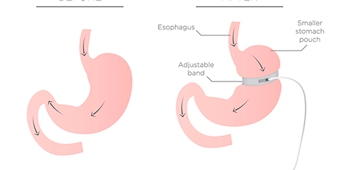
Deciding to have a gastric sleeve surgery is a big self-talk to go into, thinking about the preparations and the post-operative result might be overwhelming at first. The infinite questions about the different factors involved in making the decision could disappear once you start researching, learning, and most importantly, getting involved with the clinic or doctor you trust.
The gastric sleeve procedure, also known as a gastric sleeve, is a restrictive bariatric surgery that might change your eating habits since it significantly reduces the size of your stomach. You´ll have less appetite and this will encourage weight loss. It is an uncomplicated procedure with a shorter recovery time than others.
A gastric sleeve physically restricts the amount of food you can eat by reducing the size of your stomach. It is a restrictive surgery that also limits the production of ghrelin, which contributes to a reduction in appetite. This allows patients to feel satisfied with less food and helps them with portion control if it is recommended to them by a licensed dietitian.
In previous articles we´ve talked about the pre-operational requirements and the process during the surgery, how it is performed, and how our experts walk with you in every step of the process. However, in this piece, we mainly focus on the postoperative symptoms, like constipation, commonly known as bowel movements.
After having gastric sleeve surgery, your digestive system undergoes significant changes. The procedure involves removing a portion of your stomach, which leads to reduced food intake and changes in digestion as we mentioned. As in most parts of the body, your organs will start recovering slowly.
Bowel Movements and Constipation
The most common effect the patient might feel after the surgery is constipation. A 2019 study of the changes in bowel habits after laparoscopic sleeve gastrectomy found that “around 11% of people had one bowel movement or less per week 6 months after the procedure.
This compares to 5.6% of people before the procedure. Around 29% of people had 2–3 bowel movements per week, compared to around 24% of people before the procedure” [1].
This suggests that some people may experience symptoms of constipation for a number of months after the surgery. The frequency of bowel movements can vary from person to person after this surgery, but here are some general pro tips if you had your gastric sleeve and are wondering about your digestive system recovery process:
- Initial Days Post-Surgery: In the first few days after the surgery, your digestive system might be slow to start functioning. Bowel movements might be infrequent, and this can be due to reduced food intake and the effects of anesthesia. It’s essential to follow your surgeon’s and medical team’s instructions during this time.
- Recovery Phase: As you gradually recover and start consuming liquids (water and prune juice) and pureed foods, your bowel movements should become more regular. You might experience a more frequent need to go to the bathroom due to your new smaller stomach size and changes in diet.
- Long-Term: As you transition to a solid food diet, your bowel habits should stabilize over time. However, it’s important to note that the frequency of bowel movements can still vary depending on factors such as your diet, hydration, physical activity, and individual variations in metabolism[2].
- Dietary Changes: After a gastric sleeve surgery, your diet will likely involve smaller, more frequent meals that are high in protein and low in sugars and fats. The types of foods you eat can influence bowel movements. High-fiber foods can help promote regular bowel movements, but be cautious with fiber intake, as too much fiber could lead to discomfort.
- Hydration: Staying well-hydrated is crucial for maintaining healthy digestion and regular bowel movements. Drinking enough water can help prevent constipation, a common concern after gastric surgeries.
Although you might experience changes in your stomach, bowel pain or struggle in the digestive system, such as severe constipation, diarrhea, or other digestive issues, it’s important to reach out to your doctor. They will intervene, provide an analysis, guide you to a better recovery, and ensure your recovery is progressing as expected.
Gastric Sleeve Surgery Recovery
The timeline for feeling “normal” after a gastric sleeve surgery will vary widely from person to person, although studies[3] and data show that 2 and 3 months. Recovery and adjustment periods are influenced by factors such as individual health, adherence to post-surgery guidelines, and how well your body adapts to the changes.
- Week 1 and 2: Immediate post-surgery phase,during the first two weeks, your body is focused on healing from the surgery. You’ll likely be on a liquid and then pureed food diet to give your stomach time to adjust. It’s normal to experience discomfort, pain, and fatigue during this phase.
- Weeks 3 to 6: Transition to solid foods, as you gradually transition to eating solid foods, you might notice changes in how your stomach responds[4]. Your appetite might decrease due to the reduced stomach size, and you might feel full more quickly. Some patients experience bloating, gas, and other digestive discomforts (bowel movements) as their body adapts to new eating patterns.
- Months 2-6: By this point, you’ll likely have adapted to the dietary changes and your stomach’s new size. You might find that your energy levels are improving, and you’re getting used to your new eating habits. It’s important to continue following your doctors´ guidelines for diet, exercise, and post-surgery care during this phase.
- Months 6-12: Many patients start feeling more comfortable with their new eating patterns and may begin noticing significant weight loss during this period. Thus, it’s important to remember that weight loss can vary, and it’s crucial to focus on overall health and well-being.
- 1 Year and Beyond: By the one-year mark, you should have adapted to your new lifestyle and eating habits. Many people continue to experience weight loss and improved health outcomes during this time. It’s essential to continue regular follow-up appointments with your medical team to monitor your progress and address any concerns.
It’s worth noting that feeling “normal” can be subjective and might mean different things to different people. While some patients might feel comfortable and adjust relatively quickly, others might take longer to adapt to their new routines and mindset.
Throughout your recovery, it’s crucial to maintain open communication with your surgeon. If you experience persistent discomfort, digestive issues, “bowel movement” or concerns about your progress, they can provide guidance and support to ensure that your recovery is on track and that you’re achieving the best possible outcomes from your gastric sleeve surgery.
Contact our clinic today
At LIMARP® International Center of Excellence for Obesity, located in Tijuana, Mexico, we take your health very seriously. After your gastric sleeve surgery, we supervise and monitor the evolution of your recovery at our private hospital rooms and we make sure you progress safely into your new, more healthy life. If you have any doubts or questions about bowel movements or constipation after gastric sleeve surgery or are experiencing any suspicious symptoms after your treatment, please call us immediately. We will intervene and guide you through everything you need to know.
Also, at our clinic, we offer different non-surgical treatments for obesity in an integral bariatric program with a multidisciplinary approach. At LIMARP your medical intervention for obesity includes psychological and nutritional counseling, as well as the guidance of a fitness expert. We also offer all-inclusive packages for patients traveling from abroad, where we include lodging at our clinic’s luxurious next-door hotel, and transportation from the airport to the hotel and back.
If you are interested in getting to know more about our clinic and post-surgical services, or if you’re interested in knowing if a gastric sleeve surgery is the right choice for you, please call our phone number (619) 270 8823 or send us a message through this website or any of our social media pages. Our team of experts will be glad to help.
References
- [1] “What to know about constipation after gastric sleeve surgery”. https://www.medicalnewstoday.com/articles/constipation-after-gastric-sleeve. (Accessed July 29, 2023).
- [2] “Constipation is Common After Gastric Sleeve Surgery. Here’s What You Need to Know”. https://www.healthline.com/health/constipation/constipation-after-gastric-sleeve. (Accessed July 29, 2023).
- [3] “WHAT TO EXPECT DURING GASTRIC SLEEVE SURGERY RECOVERY”. https://www.bmisurgery.com/what-to-expect-during-gastric-sleeve-surgery-recovery/. (Accessed July 29, 2023).
- [4] Afshar S, Kelly SB, Seymour K, Woodcock S, Werner AD, Mathers JC. The Effects of Bariatric Procedures on Bowel Habit. Obes Surg. 2016 Oct;26(10):2348-54. doi: 10.1007/s11695-016-2100-9. PMID: 26894909; PMCID: PMC5018031.


